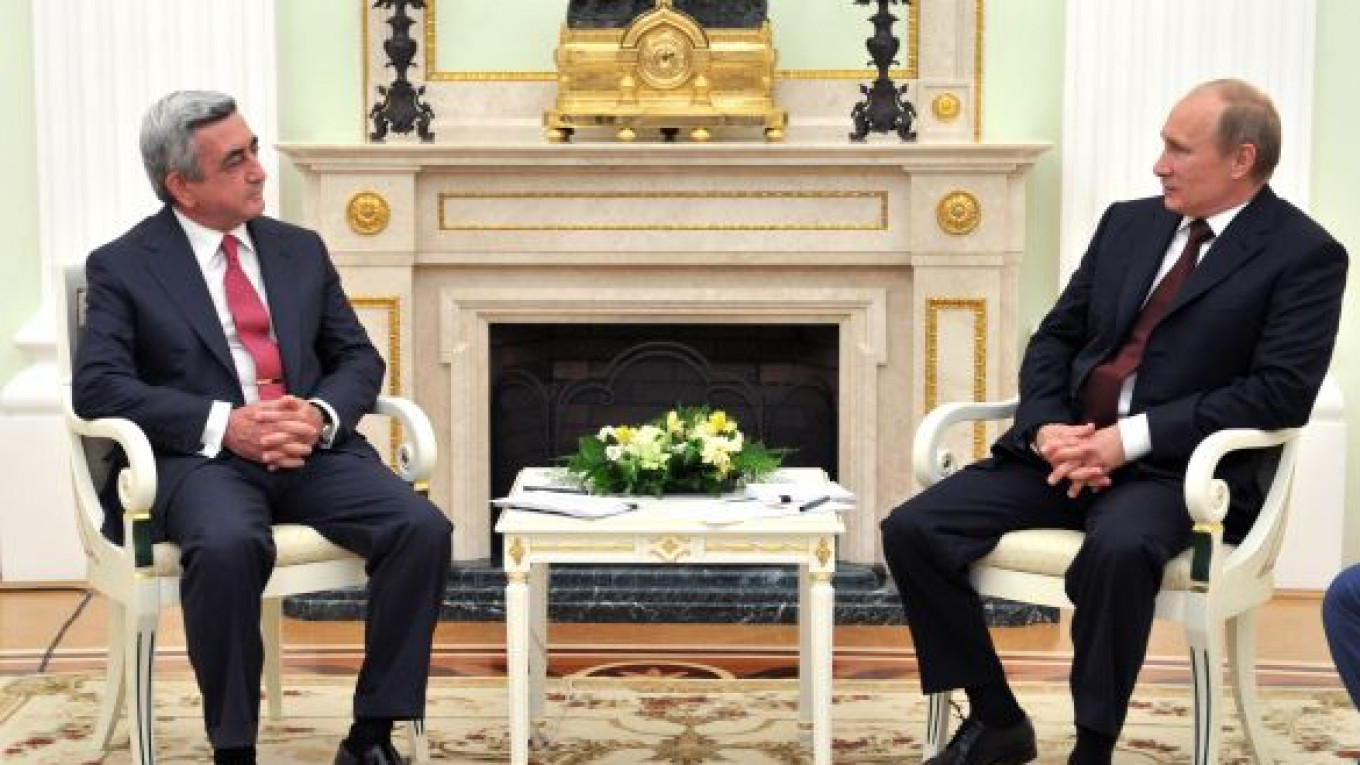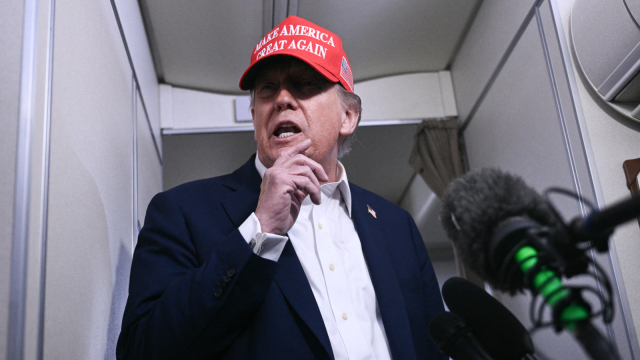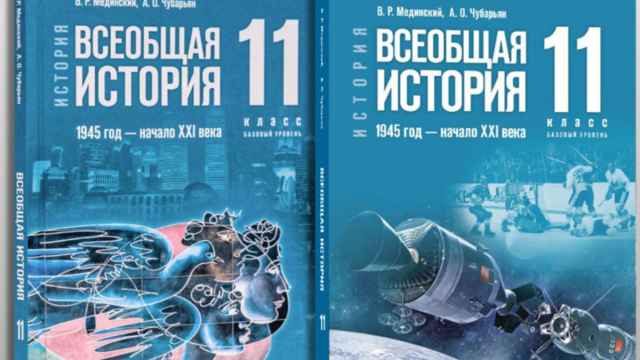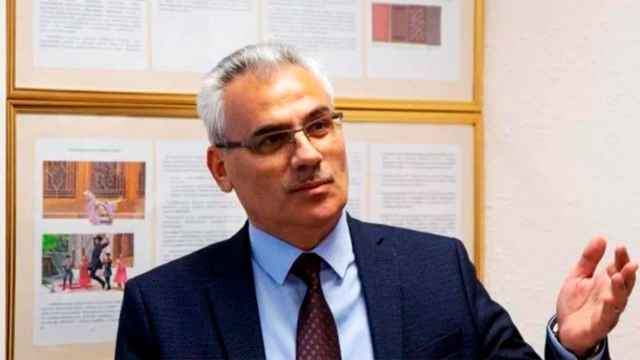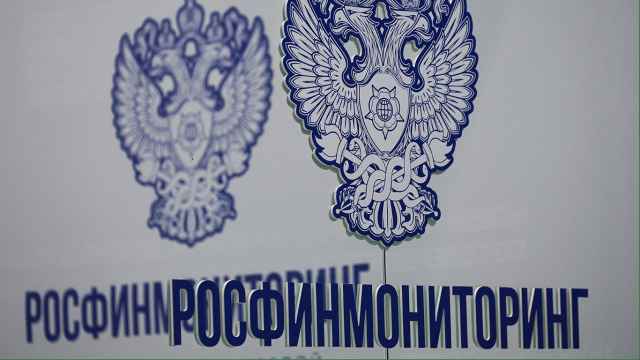Russia’s war with Georgia sparked a political sensation on its fourth anniversary Wednesday when President Vladimir Putin said that he twice called Dmitry Medvedev on the eve of the conflict, contradicting the former president’s affirmation that he alone had made the decision to send troops.
“I called Dmitry Anatolyevich twice, on Aug. 7 and 8, and the defense minister. We discussed the problem,” Putin told reporters during a news conference with his Armenian counterpart, Serzh Sargsyan, according to a transcript on the Kremlin’s website.
Medvedev said last year that he took the decision himself to go to war and that he did not talk to Putin for a whole day after ordering troops. Putin, who was then prime minister, was at the Olympic Games in Beijing when Georgian troops attacked the breakaway region of South Ossetia during the night of Aug. 7, 2008.
Putin’s comments gained special salience after retired top generals openly accused Medvedev of causing unnecessary casualties by acting too hesitantly.
The rare accusations were made by former chief of the General Staff Yury Baluyevsky and Marat Kulakhmetov, then the commander of the Russian peacekeepers in South Ossetia. In a film published online last weekend, Baluyevsky says that if Medvedev had acted according to a plan approved by the General Staff, many lives could have been saved.
"I am convinced, until there was a kick from Vladimir Vladimirovich in Beijing, everyone here, to put it mildly, was afraid of something," Baluyevsky said. Medvedev sacked Baluyevsky two months before the war amid reports over disagreements with Defense Minister Anatoly Serdyukov.
Called “Medvedev’s Cowardice Killed 1,000 People,” the film’s authors are unknown. It was by a YouTube user named Aslan Gudiyev on Aug. 5, who registered that same day with the video platform.
Putin indirectly backed the film by supporting its argument that the
Georgian attack had really started on Aug. 6, while the Russian army moved in only on Aug. 8.
In an interview with RIA-Novosti, published Wednesday, the president said that there had been “three days of fighting on Aug. 6, 7 and 8.
Asked if he had insisted on sending troops during those days, Putin merely said “that is another question.”
The Russian armed forces quickly defeated the Georgians and went on to temporarily occupy large swaths of the south Caucasus nation. Moscow then recognized the two Georgian breakaway republics of Abkhazia and South Ossetia as independent and stationed thousands of troops there.
Medvedev defended his actions on Wednesday during a visit to South Ossetia to take part in commemoration events.
"This decision [to send the army to Georgia] was taken on time, quickly enough, we managed to avoid significantly bigger losses. I managed to take the decision which restored balance and brought peace," Medvedev said in the regional capital, Tskhinvali, according to news reports.
Four years later, relations between Moscow and Tbilisi remain in a deep freeze and the results of the four-day war continue to complicate foreign and security policy between Russia and the West.
Both countries' leaders remain on non-speaking terms and analysts say that even a handshake between Georgian President Mikheil Saakashvili and Putin or Medvedev would amount to a miracle.
Earlier this week, Saakashvili, a staunch U.S. ally, used the Aug. 8 anniversary for trademark speeches in which he accused the Kremlin of continuing to plot annexing all of Georgia.
"No matter how much our invaders and their local stooges may dream about it, the Soviet Union will not be restored," Saakashvili said in a televised address, the Civil.ge website reported.
He added that Moscow had failed to achieve three goals in the war: to overthrow his government and "physically destroy" its leaders, to undermine Georgia's role as an energy transit route, and to stop Tbilisi's course of integration with NATO and the EU.
Saakashvili, speaking at a military academy in Gori, the city closest to South Ossetia, also suggested that regime change was imminent in Russia and that Abkhazia and South Ossetia would be liberated “in a short time.”
"Very soon … we will witness a new Russia … that will reject imperial fantasies, a Russia that will start building democracy. And we will start sorting out relations with such a Russia," he said.
In a speech to locals from nearby villages, where many refugees from South Ossetia live, Saakashvili promised they could return soon and referred to Russia as the enemy and the conquerors. “We will definitely free our country, Kartli, our gorges, villages, and return our homes,” he said, according to a transcript on his website.
Saakashvili's saber-rattling rhetoric was downplayed by Deputy Foreign Minister Grigory Karasin as nothing extraordinary. “The world is already using his unrestrained policies. Let God be his judge,” Karasin said in an interview published on the Foreign Ministry's website.
A Message from The Moscow Times:
Dear readers,
We are facing unprecedented challenges. Russia's Prosecutor General's Office has designated The Moscow Times as an "undesirable" organization, criminalizing our work and putting our staff at risk of prosecution. This follows our earlier unjust labeling as a "foreign agent."
These actions are direct attempts to silence independent journalism in Russia. The authorities claim our work "discredits the decisions of the Russian leadership." We see things differently: we strive to provide accurate, unbiased reporting on Russia.
We, the journalists of The Moscow Times, refuse to be silenced. But to continue our work, we need your help.
Your support, no matter how small, makes a world of difference. If you can, please support us monthly starting from just $2. It's quick to set up, and every contribution makes a significant impact.
By supporting The Moscow Times, you're defending open, independent journalism in the face of repression. Thank you for standing with us.
Remind me later.



